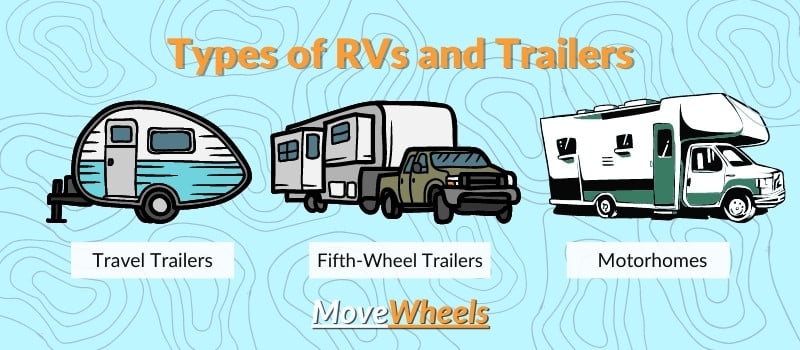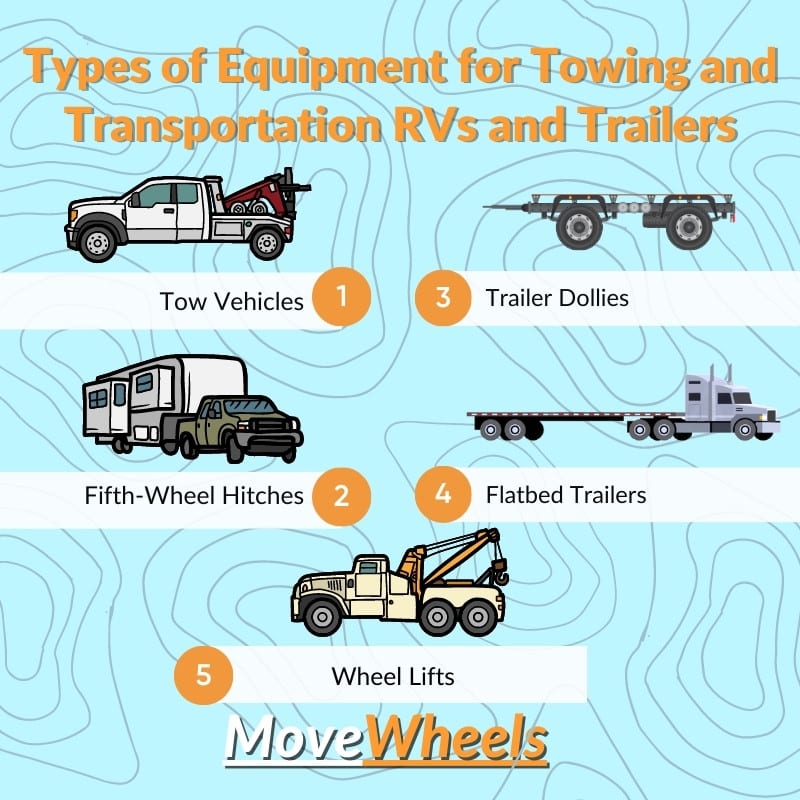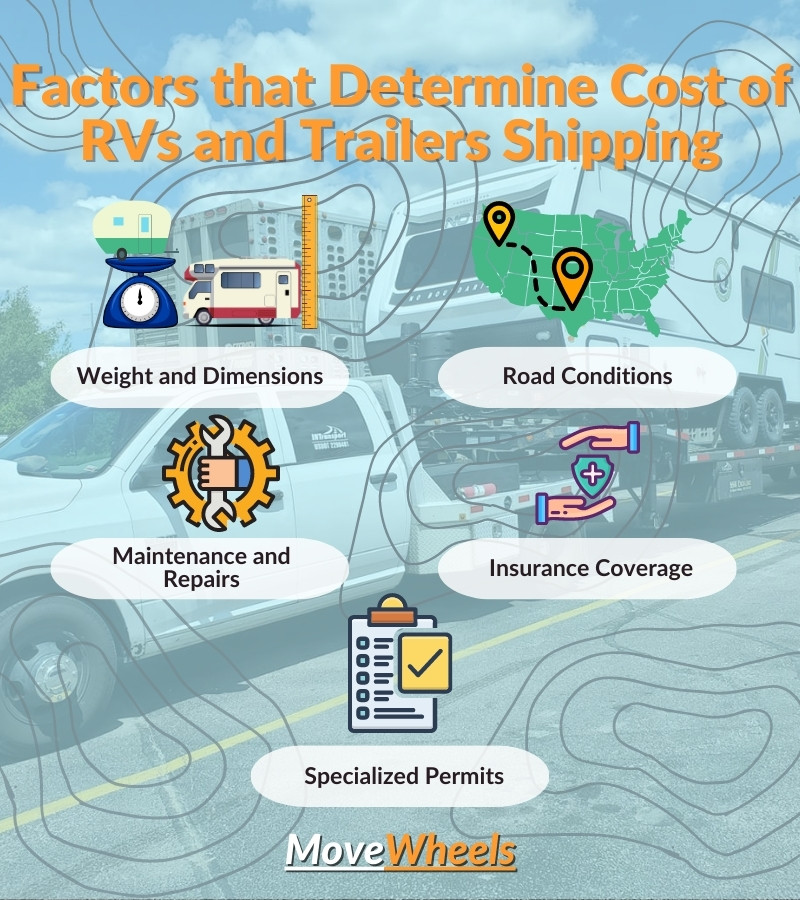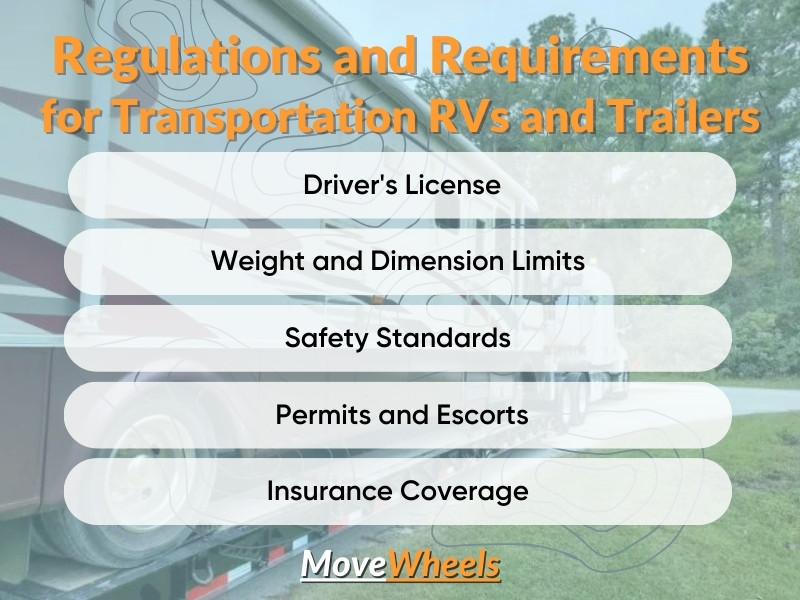Transporting recreational vehicles (RVs) and trailers can be a complex and challenging process. Whether you’re planning a cross-country road trip or moving to a new location, it’s important to ensure that your RV or trailer is transported safely and efficiently. As a top provider of RV moving services and trailer transport solutions, MoveWheels has the experience and expertise needed to help you navigate this process successfully. In this article, we will provide you with valuable information and tips on how to safely transport your RV or trailer, including selecting the right towing vehicle and equipment, performing pre-trip inspections, complying with regulations, and maintaining your RV or trailer. We’ll also answer some frequently asked questions about RV transport cost and other related topics. By following our guidelines, you can ensure that your RV or trailer arrives at its destination in the best possible condition.
Types of Recreational Vehicles and Trailers
At Movewheels, our auto transport services cover a variety of recreational vehicles (RVs) and trailers. To ensure a safe and successful move, it’s important to have a good understanding of the different types of RVs and trailers we transport. Here’s a breakdown of some of the most common types:

Travel Trailers
These are non-motorized trailers that are towed by a separate vehicle, such as a pickup truck or SUV. They can range from 10 to 35 feet in length and can weigh anywhere from 1,000 to 10,000 pounds. When transporting travel trailers, we ensure that the towing vehicle is compatible with the trailer and can handle its weight and size.
Fifth-Wheel Trailers
These are larger trailers that are towed by a pickup truck with a fifth-wheel hitch. They range from 20 to 45 feet in length and can weigh up to 15,000 pounds. It’s important to have the appropriate towing vehicle and hitch to transport these trailers safely.
Motorhomes
These are self-contained vehicles that have living quarters and are driven like a regular vehicle. They can range from 16 to 45 feet in length and can weigh up to 30,000 pounds. When transporting motorhomes, we ensure that the dimensions are taken into account and that the vehicle is secured properly for transport.
Whether you’re moving across the country or just a few states away, transporting your RV or trailer can be a daunting task. By understanding the size and type of your trailer, as well as the selection of the mode of transport, you can ensure a safe and successful move. At Movewheels, we specialize in transporting a wide range of RVs and trailers, and we can provide you with the appropriate equipment and expertise to get your vehicle to its destination efficiently and safely. If you’re in need of RV or trailer transportation services, don’t hesitate to contact us today for a free quote.
Towing and Transportation Equipment for RVs and Trailers
Transporting recreational vehicles and trailers requires specialized equipment to ensure safety and efficiency. Here are some of the key equipment options for towing and transportation:

When transporting RVs and trailers, it’s essential to have the appropriate equipment to ensure that the vehicle is secured properly and that the move is completed safely and efficiently. The right equipment can vary depending on the type and size of the vehicle, so it’s important to consult with a professional transportation company like Movewheels to determine the best options for your specific needs.
Towing and Transportation Considerations
Transporting an RV or trailer requires careful planning and consideration to ensure that the move is safe and efficient. Here are some key considerations to keep in mind when towing or transporting a recreational vehicle:

By keeping these key considerations in mind, you can ensure that your RV or trailer is transported safely and efficiently. Whether you’re moving your vehicle across the state or across the country, it’s essential to work with a reputable transportation company to ensure that the move is completed with the utmost care and professionalism.
Regulations and Requirements
When it comes to transporting recreational vehicles and trailers, there are several regulations and requirements to keep in mind to ensure that the move is safe and compliant. Here are some of the key regulations and requirements to consider:

Failing to comply with regulations and requirements can result in costly fines, delays, and even accidents. It’s crucial to stay informed and up-to-date on regulations and requirements to ensure a successful move. By partnering with a professional transportation company, you can have peace of mind knowing that all necessary regulations and requirements are being met.
Towing and Transportation Services
When it comes to towing and transporting your RV or trailer, you have the option to do it yourself or hire a professional service. Here are some considerations for both options:
DIY vs. Professional Services
If you have experience with towing and transportation, doing it yourself could save you money. However, if you lack experience or the proper equipment, attempting to tow or transport your RV or trailer could be dangerous and potentially result in costly damages.
Hiring a professional RV towing and transportation service ensures that your RV or trailer is handled by experienced and qualified personnel who have the necessary equipment to do the job safely and efficiently.
Choosing a Reliable Transport Company
If you decide to hire a professional towing and transportation service, it is important to choose a reliable company. Here are some tips to help you choose the right company:
RV Storage and Maintenance
When it comes to RV storage and maintenance, there are a few things to keep in mind:
By following these tips, you can ensure that your RV or trailer is safely and efficiently transported to its destination.
In conclusion, towing and transporting recreational vehicles and trailers requires careful consideration of various factors, including equipment, regulations, and the choice of DIY vs. professional services. Whether you decide to do it yourself or hire a professional transport company, it is important to ensure that your RV or trailer is handled safely and efficiently. By keeping these tips in mind, you can make sure that your RV or trailer arrives at its destination in good condition. And if you do choose to hire a professional service, it is important to choose a reliable and experienced company like MoveWheels to handle your transportation needs.
FAQ
How much does it cost to transport an RV or trailer?
The cost of transporting an RV or trailer can vary depending on several factors, including the distance, size and weight of the RV or trailer, and the mode of transport. To get an accurate estimate, it is best to contact a professional transport company like MoveWheels for a quote.
What type of vehicle is best for towing a travel trailer?
The type of vehicle that is best for towing a travel trailer depends on several factors, including the weight of the trailer, the towing capacity of the vehicle, and the type of terrain you will be traveling on. In general, a pickup truck or SUV with a powerful engine and adequate towing capacity is best for towing a travel trailer.
Do I need a special license to tow an RV or trailer?
The requirements for towing an RV or trailer vary depending on the weight and size of the vehicle. In most cases, a standard driver’s license is sufficient for towing a small trailer or RV, but for larger vehicles, you may need a commercial driver’s license (CDL) or a special endorsement on your license.
How should I prepare my RV or trailer for transport?
Before transporting your RV or trailer, it is important to perform a thorough inspection and make any necessary repairs or maintenance. You should also remove any loose or detachable items, secure all doors and windows, and empty and clean all tanks and holding compartments.
What should I look for when choosing a transport company?
When choosing a transport company, it is important to look for a company that is licensed, insured, and experienced in transporting RVs and trailers. You should also check reviews and ask for references to ensure that the company is reliable and trustworthy. Finally, be sure to get a detailed quote and ask about any additional fees or charges that may apply.
Similiar Articles
- How to Ship Multiple Cars at Once: Family Moves, Small Fleets, and Bulk Discounts
- How One of the Top RV Shipping Companies Stands Out
- Best Online Car Buying Platforms – The Ultimate Guide
- The Definitive 2025 Guide to the Cheapest Ways to Ship a Car
- Costco Auto Transport Made Easy – Ship Your Car Hassle‑Free with MoveWheels
- Is Your RV Ready for Spring Travel? Pre-Transport Checklist
- Open Vehicle Transport: How it Works and How Much It Costs in 2024
- Secure and Sophisticated: Your Complete Guide to Enclosed Auto Transport with MoveWheels
- New Year, New Motorcycle: Top Motorcycles` Choice among Americans in 2024
- How Vehicle Type Impacts Transportation Costs: From Cars to Heavy Equipment
